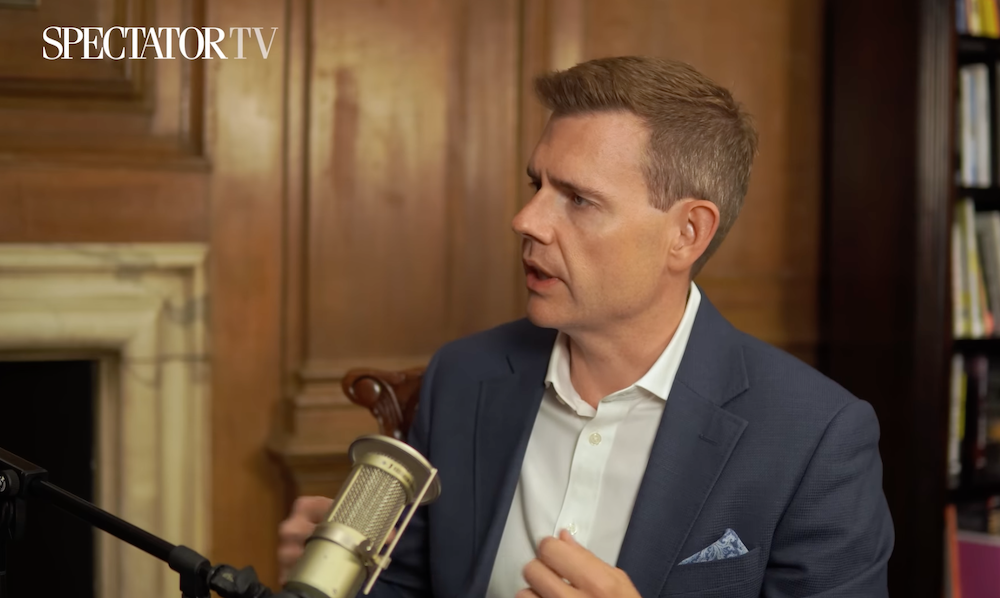For years, Germany, like Britain, has drifted through history as though nothing could ever again disturb its peace. The world outside was assumed to be orderly, rational, restrained. Conflict was something that happened elsewhere. The Bundeswehr, neglected to the point of embarrassment, became a case study in strategic complacency. Germany’s political class preferred moral posturing to the dull, necessary business of national defence.
Some fear that conscription is merely a prelude to sending Germany’s youth into war
And as long as Russia was merely grumbling at its neighbours rather than invading them, Berlin convinced itself it could go on like this forever. Those days are over. And Germany, finally – belatedly – has admitted as much.
This week’s agreement between the governing coalition parties to reintroduce military service marks the first unmistakable shift in German security policy for a generation. It is a moment of clarity long resisted, especially by the Social Democrats, whose view of the world has for decades been shaped by the illusion that threats can be managed by dialogue alone. The bitter reality of dealing with Vladimir Putin has stripped that fantasy bare.
Compulsory service for 18-year-old men may look, to some, like an overreaction. In truth, it is the minimum a serious country does when confronted with the concrete possibility of war on its own continent.
Russia’s brutal assault on Ukraine shattered Europe’s post-Cold War certainties. Yet Germany – for all its rhetorical hand-wringing, for all the frantic speeches about Zeitenwende – remained slow, almost paralytically so. Chancellor Olaf Scholz personally blocked earlier attempts to restore military service, clinging to political comfort even as Russian tanks flattened Ukrainian cities. A nation that once prided itself on its strategic discipline instead became an emblem of dithering.
Precious years were lost. But at last the drift has ended.
The new service model follows a pragmatic logic: begin with incentives and voluntarism, but embed the legal, financial and administrative machinery necessary to scale up rapidly when required. This is not a reckless dash toward militarisation but a sober recognition that Germany’s existing force – 180,000 active troops and a paltry 35,000 reservists – cannot sustain a credible defence posture in a Europe where Russia has revived territorial conquest as a tool of statecraft. By 2035, Germany aims for up to 270,000 active troops and roughly 200,000 reservists. That is what realism looks like.
Predictably, the usual quarters on the Left have already denounced the return of conscription as a step toward militarism, while the AfD screams that Berlin risks provoking Russia by acknowledging it as an adversary. Both claims are absurd. Germany is not choosing confrontation; confrontation has already arrived. What Germany is choosing, belatedly, is responsibility. And responsibility does not come cheaply.
Re-establishing the nationwide network of selection offices, dismantled in 2011, is a bureaucratic feat of its own. The real challenge will be to equip the new soldiers and have enough beds. By mid-2027 every man of the 2008 birth cohort and after will be summoned for assessment. Families may balk; some will be outraged. Who, after all, expected that German teenagers would ever again receive draft notices? But what did we think national security was: a subscription service we could cancel the moment it became inconvenient?
The young men who find themselves reporting for service will discover a truth their parents have long forgotten: safety is not an entitlement but a collective investment. The European continents prosperity, its stability, its treasured freedoms – none of these are self-sustaining. They rest on the willingness of ordinary citizens to defend them.
And yes, some fear that conscription is merely a prelude to sending Germany’s youth into war. But if Russia ever moved against Germany, it would not merely be conscripts who fought; it would be every man up to the age of 60, and women in civil defence roles. That is what an existential conflict entails. The point of rebuilding the Bundeswehr is precisely to prevent such a scenario from ever materialising.
Deterrence only works if it is believed. For too long, Europe has relied on hope instead of hard power. Berlin’s renewed seriousness – from lifting the self-imposed debt taboo on defence spending to speeding up procurement and cutting the red tape strangling infrastructure – is the most important signal Germany has sent in decades. It tells Moscow that the era of European passivity is ending.
Europe’s geopolitical environment is not ‘returning’ to something; it has already changed. Russian hybrid attacks, sabotage operations, cyber strikes: these are not preludes but components of a long-term strategy aimed at weakening Western societies from within. Germany has at last accepted the logic of its own vulnerability.
Britain should pay close attention. If the continent’s largest economy can admit that its post-2011 approach to defence was a historic mistake, others cannot continue pretending the world remains as it was in 1998. Conscription debates will spread. They must. Because if we cling to the comforting myths of the past – that peace is permanent, that threats can be managed by indignation alone, that someone else will do the fighting – we will wake up one morning to discover that the future has been decided for us.
Germany’s return to seriousness is not a provocation. It is a warning. If Europe does not embrace the world as it is – unstable, dangerous, shaped by force – then Russia will shape it for us. And we may not like the result.







Comments